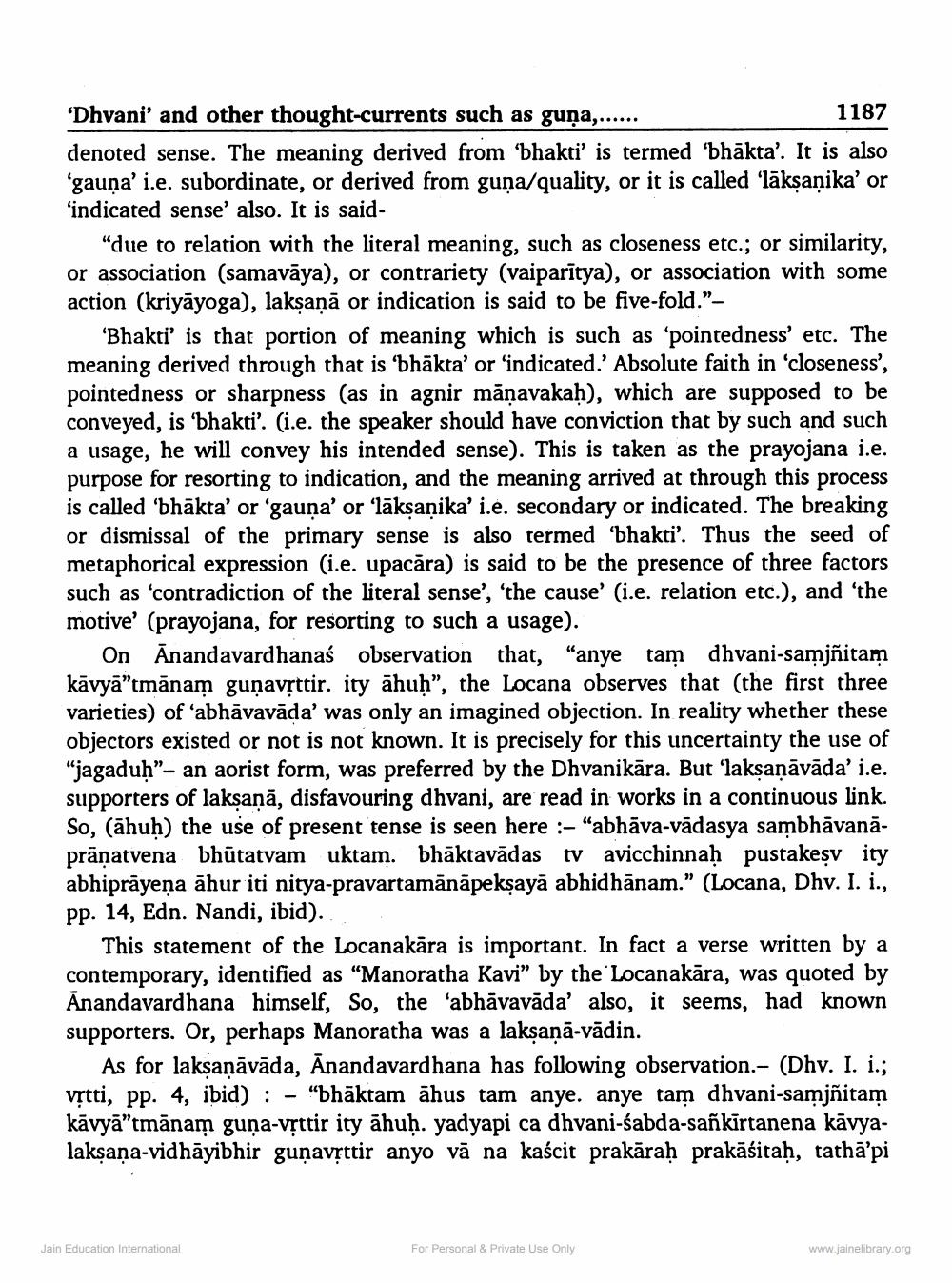________________
'Dhvani' and other thought-currents such as guņa,.....
1187 denoted sense. The meaning derived from 'bhakti' is termed 'bhākta'. It is also 'gauņa' i.e. subordinate, or derived from guņa/quality, or it is called 'lākṣaṇika' or 'indicated sense' also. It is said
"due to relation with the literal meaning, such as closeness etc.; or similarity, or association (samavāya), or contrariety (vaiparītya), or association with some action (kriyāyoga), laksanā or indication is said to be five-fold."
"Bhakti' is that portion of meaning which is such as 'pointedness' etc. The meaning derived through that is 'bhākta' or 'indicated.' Absolute faith in 'closeness', pointedness or sharpness (as in agnir māņavakah), which are supposed to be conveyed, is 'bhakti'. (i.e. the speaker should have conviction that by such and such a usage, he will convey his intended sense). This is taken as the prayojana i.e. purpose for resorting to indication, and the meaning arrived at through this process is called 'bhākta' or 'gauna' or 'lāksanika' i.e. secondary or indicated. The breaking or dismissal of the primary sense is also termed 'bhakti'. Thus the seed of metaphorical expression (i.e. upacara) is said to be the presence of three factors such as 'contradiction of the literal sense', 'the cause' (i.e. relation etc.), and 'the motive' (prayojana, for resorting to such a usage).
On Ānandavardhanaś observation that, “anye tam dhvani-samjñitam kāvyā"tmānam gunavrttir. ity āhuh", the Locana observes that the first three varieties) of 'abhāvavāda' was only an imagined objection. In reality whether these objectors existed or not is not known. It is precisely for this uncertainty the use of "jagaduh"- an aorist form, was preferred by the Dhvanikāra. But 'laksanāvāda' i.e. supporters of laksaņā, disfavouring dhvani, are read in works in a continuous link. So, (āhuh) the use of present tense is seen here :- "abhāva-vādasya sambhāvanāprānatvena bhūtatvam uktam. bhāktavādas tv avicchinnaḥ pustakeşvity abhiprāyena āhur iti nitya-pravartamānāpeksayā abhidhānam." (Locana, Dhv. I. i., pp. 14, Edn. Nandi, ibid).
This statement of the Locanakāra is important. In fact a verse written by a contemporary, identified as "Manoratha Kavi" by the Locanakāra, was quoted by Anandavardhana himself. So, the abhāvavada' also, it seems, had known supporters. Or, perhaps Manoratha was a lakṣaṇā-vādin.
As for laksaņāvāda, Ānandavardhana has following observation.- (Dhv. I. i.; vrtti, pp. 4, ibid) : - "bhāktam āhus tam anye. anye tam dhvani-samiñitam kāvyā"tmānam guna-vrttir iry āhuh. yadyapi ca dhvani-sabda-sankirtanena kāvyalaksaņa-vidhāyibhir gunavịttir anyo vā na kaścit prakāraḥ prakāśitaḥ, tathā’pi
Jain Education International
For Personal & Private Use Only
www.jainelibrary.org




